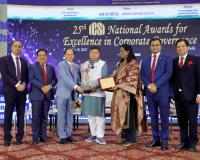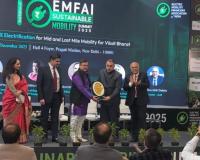PM Modi Inaugurates 32nd International Conference of Agricultural Economists, Emphasizes India's Role in Global Food Security
India Showcases Sustainable Agriculture Solutions at ICAE 2024

New Delhi : Prime Minister Narendra Modi addressed the 32nd International Conference of Agricultural Economists (ICAE) at the National Agricultural Science Centre (NASC) campus in New Delhi today. In his address, Modi emphasized India's pivotal role in finding solutions for global food and nutrition security. The conference, held in India after 65 years, aims to tackle sustainable agriculture in the face of challenges such as climate change, natural resource degradation, rising production costs, and conflict. The event saw participation from about 1,000 delegates representing approximately 75 countries.
Prime Minister Modi underscored the longevity and relevance of ancient Indian agricultural practices and the scientific and logical foundations behind them. He highlighted the medicinal properties of food grains and the significance of agricultural traditions in India. Remembering Sardar Vallabhbhai Patel's contributions to the upliftment of farmers, Modi stressed the importance of the country's diverse agro-climatic zones and their role in global food security.
Reflecting on the previous ICAE held in India 65 years ago, Modi noted the nation's transformation from a food-insecure, newly independent country to a food surplus nation. Today, India is the largest producer of milk, pulses, and spices, and the second-largest producer of food grains, fruits, vegetables, cotton, sugar, tea, and farmed fish. The Prime Minister emphasized India's shift from being a concern for global food security to providing solutions for global nutrition and food security, particularly benefiting the Global South.
Modi reiterated India's commitment to global welfare with the concept of 'Vishwa Bandhu' and mentioned India's various global welfare mantras, including 'One Earth, One Family and One Future,' 'Mission Life,' and 'One Earth One Health.' He emphasized that agriculture is central to India's economic policies, highlighting the significant role of small farmers, who constitute 90% of India's farming community and are vital to the country's food security.
The Prime Minister also highlighted the focus on sustainable and climate-resilient farming in this year's budget and the development of a supportive ecosystem for India's farmers. He informed that around 1,900 new climate-resilient crop varieties have been introduced to farmers in the past decade. Modi gave examples of innovative agricultural practices, such as rice varieties that require 25% less water and the rise of black rice as a superfood due to its medicinal properties. He expressed India's eagerness to share these agricultural advancements with the global community.
Addressing global challenges like nutrition, water scarcity, and climate change, Modi presented Shree Ann, or millets, as a superfood solution requiring minimal water for maximum production. He highlighted last year's celebration of the International Year of Millets, demonstrating India's commitment to promoting millets globally.
Prominent figures at the event included Union Agriculture and Farmers Welfare Minister Shivraj Singh Chouhan, NITI Aayog Member Professor Ramesh Chand, Conference Chairman Professor Mateen Kayam, and Secretary DARE and Director General ICAR Dr. Himanshu Pathak.






